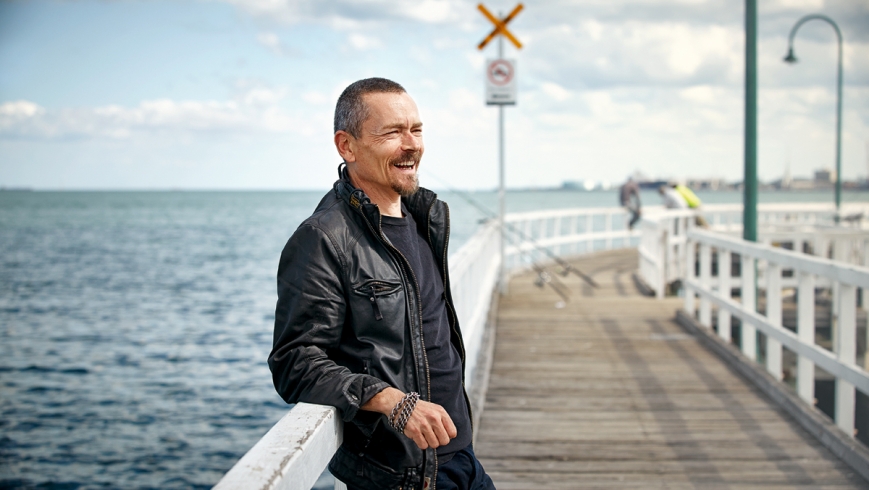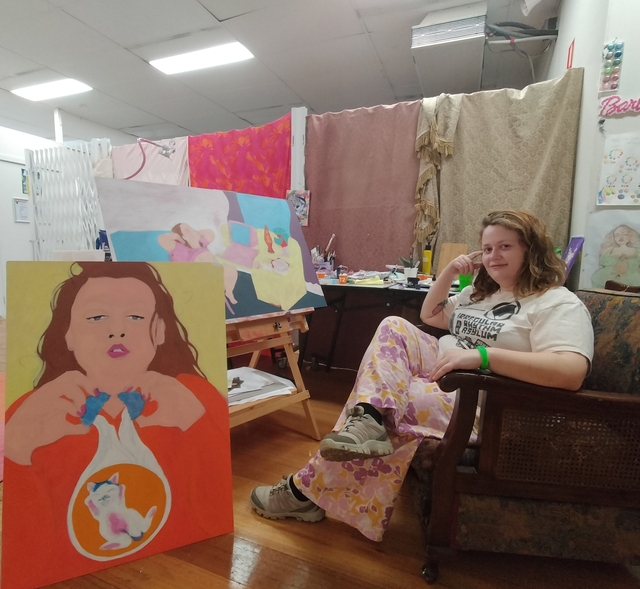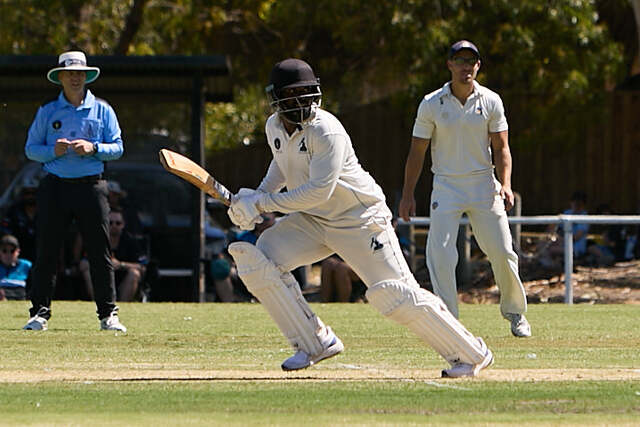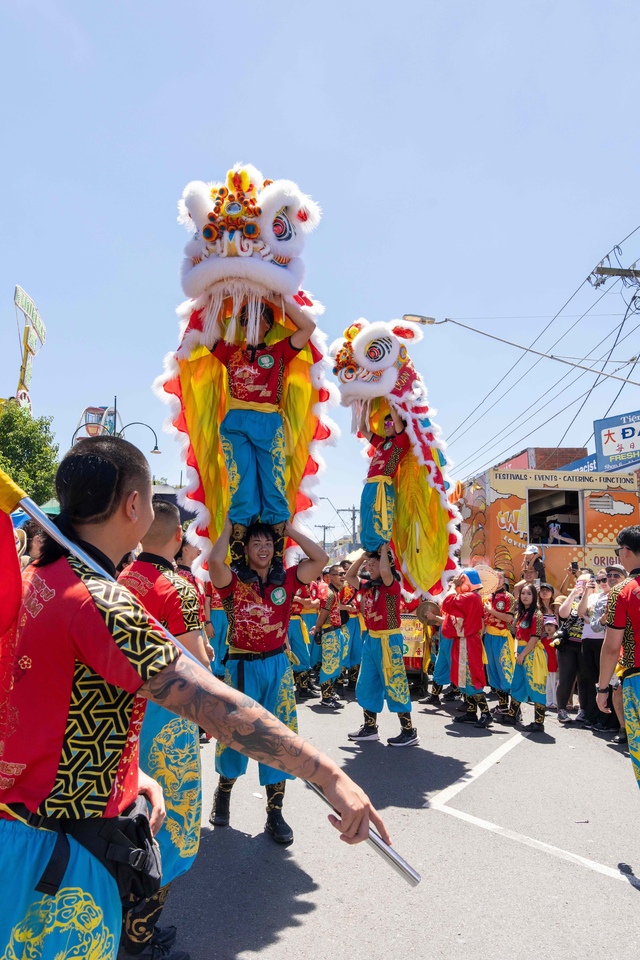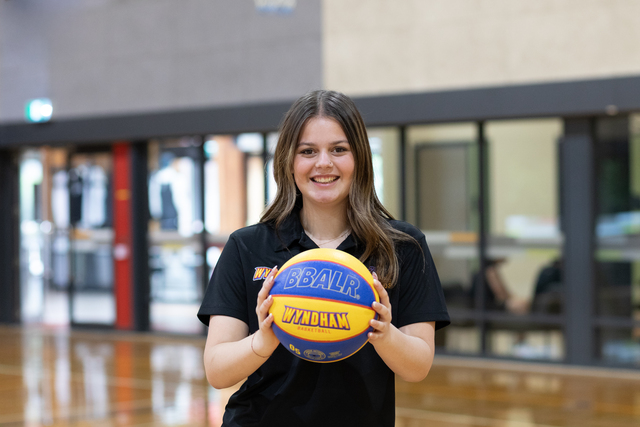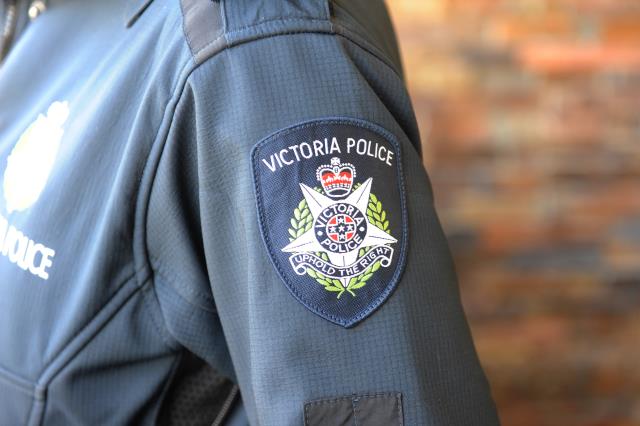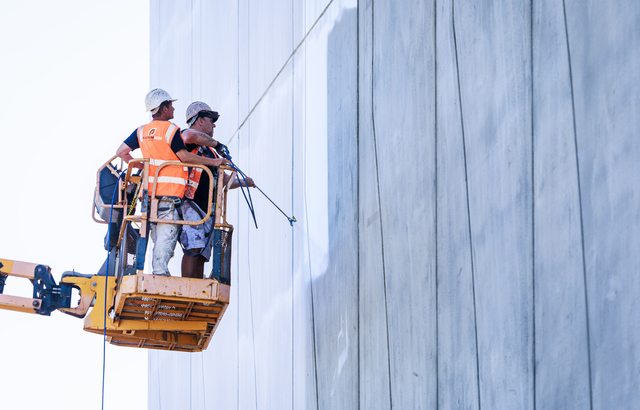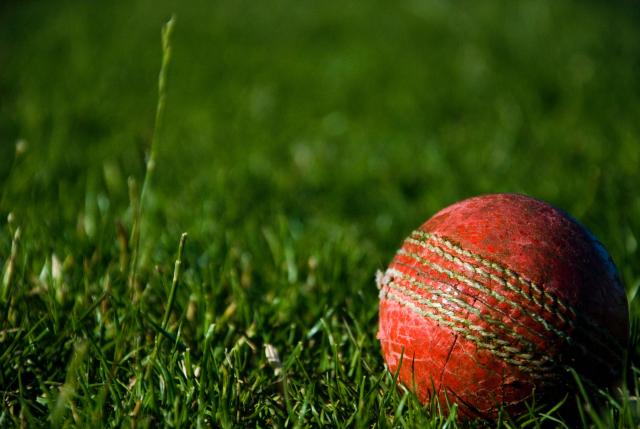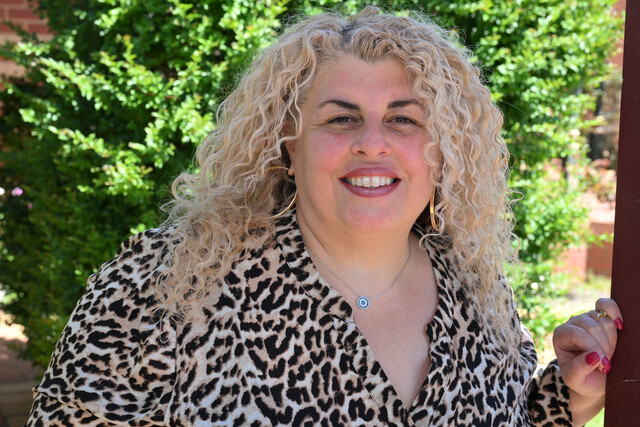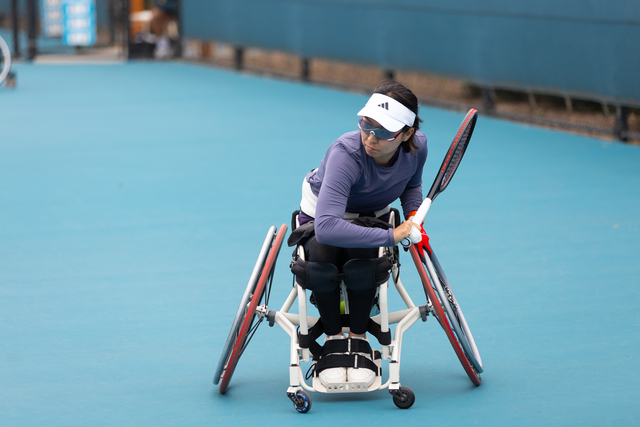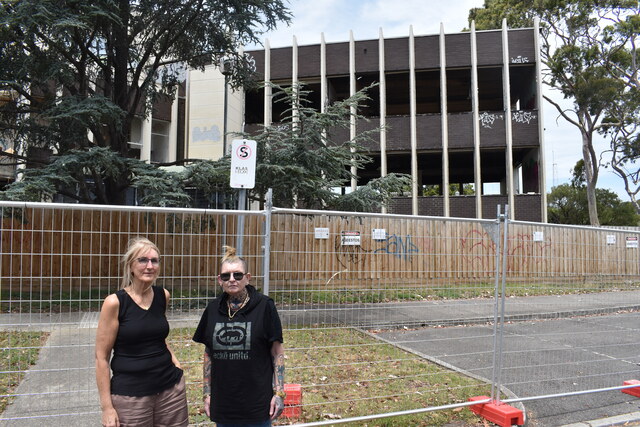At first it looked like a grey fish just under the surface of the water. But as it swam closer to Port Melbourne pier, it turned out it wasn’t a fish at all.
I’ve seen a lot of things in Port Phillip Bay; dolphins, a big stingray, and for one whole summer there was phosphorescent algae that would illuminate at night when you swept your hand through the water. But I’ve never seen a penguin in broad daylight swimming alone in the ocean. Neither has chef and former The Cook and the Chef co-host Simon Bryant.
“Oh wow!” he says, looking around photographer Jules Tahan. We both lean over the white railing to get a better look. The penguin’s mission becomes obvious. The sea water, as green and clear as glass under the bright sun, is heaving with clouds of whitebait. At one point, the penguin looks up, sees us and with a flip of its fins dives deeper into the blue, parting the school of fish like Moses did.
Bryant and I have come from an event at the Port Melbourne Yacht Club put on by the Marine Stewardship Council, whose mission is to ensure the ocean is “teeming with life”. Nothing illustrates the importance of healthier oceans quite like this moment with this little creature that might have been bi-catch if trawler fishing was allowed in the bay.
Bryant appeared at the lunch among stallholders including the World Wildlife Fund and a tiny Coorong fishery called Coorong Wild Seafood, as an advocate for sustainable seafood practices. Why does he care?
“The bi-catch of trawler fishing is just horrendous. It’s like using a bulldozer to harvest a cow,” he says. “In the process you chew up sheep, houses, backyards, the pet dog, whatever’s in its path.”
Bryant’s passion for the cause comes out in his delivery. He’s small, but I still wouldn’t take him on in a fight. Not just because of his leather jacket, large-link steel bracelets or his macho, perfectly suited Steve McQueen TAG Heuer Monaco wristwatch. Bryant is fiery, whip smart and you can tell from the look in his eyes that he’s Never. Going. To. Give. Up.
Listening to Bryant at lunch, over oven-roasted hoki, grilling larger scale commercial seafood companies about the cortisol (stress) levels of their farmed salmon or ocean trout, I’m reminded of the first time we spoke. It was about three years ago. I’d called him to get a quote about Maggie Beer, with whom Bryant co-hosted one of Australia’s most popular cooking shows, The Cook and the Chef, from 2005-2009.
He’d spoken fondly of Beer for 10 minutes, said he missed her, and then flipped the conversation on its head. He told me he’d just arrived back from China. He said he’d seen “dogs being beaten, boiled, electrocuted and slit up in abattoirs”.
He detailed what he’d seen of moon-bear farming. Within minutes I was militarised to his cause, Animals Asia, an organisation devoted to ending bear bile farming, and to which he is happy to lend his support as ambassador.
Now Bryant is installed with a double short macchiato at a pub across the road from the pier. I have to ask him: is his work as an advocate for causes and for food festivals such as Tasting Australia – a fine food and wine event in South Australia where he is creative director – actually the point? Beyond cheffing?
“Chefs have huge influence,” he says. “Either it’s media power thanks to a TV show or it’s purchasing power. I mean, you might be running a venue that purchases $4 million worth of food a year, which was my former life as executive chef at the Adelaide Hilton. You can dent the market and you can reward people who are doing best practice. And, without sounding like a zealot, you can definitely communicate that down the line to a customer.”
Bryant’s tetchiness around the idea of zealotry is what makes him, among all this passion for change, and for purity of product and protection of animals, eminently likeable.
“There are enough criticisers out there,” he says.
“I’ve got plenty of haters myself. I’ve got things that people don’t like on my menus, whether it is wild-shot this, or wild-caught that. Whatever the problem is, if somebody alienates you and criticises you for any reason, I don’t think it produces a constructive response. It certainly doesn’t from me. I’m not at my best when you corner me and tell me that all my choices are wrong. So I do try to keep it in check and reward best practice instead of just hating on bad practice.”
Bryant’s humility also comes from essentially having fallen into a career as a chef and becoming something of a local hero in the process. He never intended to be a hero. He never really intended to be a chef.
He completed an apprenticeship as a motor mechanic after finishing school, then enrolled in commerce at Adelaide University before moving to Melbourne University to study industrial relations. Hospitality was meant to be what paid for his education.
“I got a job at Melbourne Uni in the kitchen because they brought in HECS fees. It’s funny how you fall into stuff,” he says. “Cooking is one part mindless repetition, which becomes a kind of muscle memory, and I actually think it’s one part blind luck sometimes. You can do everything right technically and you can do everything right by method, and it could still fail. And I think that if you like people, feeding them is not a bad job. It is a good feeling.”
As he talks, Bryant’s eyes wander to the stainless-steel splashback of the partly open kitchen behind the bar. What does he feel when he sees a kitchen in a restaurant or a pub? “Most of the time, if I see a kitchen when I’m out, I’d rather be there,” Bryant says.
“I am bored eating dinner compared to cooking it.”
“You could take me to the fanciest whatever – in France – and I kind of feel jealous of the kitchen.”
He tells a story about recently eating at Balthazar in New York, a famed bistro serving French fare. Bryant asked if he could see the kitchen – the manager gave him an “are you a health inspector look, but I could tell they thought I was too dirty to be one”.
Did he pull the “Big in Australia” card? “No! They let me in anyway and it just occurred to me that kitchens are all the same. They all have the same characteristics. You know, a waiter eating chips, the chef that has finished his orders, the other guy that is in the hot line and no one is helping him. They would, but they just want to see him bleed. It’s just the same dynamic you know? Every kitchen, it’s a piss-take. It’s like a pirate ship, it really is.”
The rush of cheffing, he says, with his eyes gleaming, is in “trying to create order out of chaos, especially when you are running a line. You are trying to get guys co-ordinated that are working at different paces and the workload might have fallen in a different way that night, the grill section might be busier, or some dishes might be more in demand.
“You’re trying to get eight plates from five different sections together for one table and meanwhile you’re thinking about the table before, or the next five tables after, and who’s ready for dessert. You’re like a mad traffic controller on an 800[-millimetre] pass. And I like that.”
On the subject of cheffing and exhilaration, where to now for Bryant? Has he changed the fine dining style he was known for as the second half of the dynamic duo that was The Cook and the Chef?
“When we were filming The Cook and the Chef, I’d just come out of a long stint in fine dining and before that a relatively long stint in brasserie style,” Bryant says. “I think my food was probably too detailed then. Maggie was always making fun of my level of detail and how I had to chop something perfectly.
“Now I’m all about speed. We changed our street food laws in Adelaide three years ago and we allowed a lot of vendors out in public space. I chucked my wok down early in the piece when they freed up the legislation, took an Esky, and just cooked until I sold out. I just banged out dishes in two minutes.”
Bryant fires up his burners at street food events in Adelaide, as well as university orientation days, festivals and even weddings.
“Our offerings are vegan and vego Asian street foods. We are pretty rudimentary, with no truck, just a van, an Esky and a few wok burners.”
It’s a far cry from his days at the Adelaide Hilton and the revered Grange fine dining room.
“I absolutely love it and, you know, I just have a piece of string I cordon off my area with … I’ve seen them in Asia with their tricycle with the wok on the back. People can see all the food, there’s no refrigeration, so it’s got to be fresh that day. You get up really early, cut it all, you make the roti, fry the tofu, whatever you are doing, take it all out,’’ he says. “I like it when you see the queue get bigger and bigger and you think ‘how am I going to dig myself out of this?’ But I think the proximity to your customer is really important. I think we put chefs on a bit of a pedestal.”
The experience made Bryant feel he’d come full circle. His first gig as a chef was at a Thai restaurant where it was all “hot woks, fresh ingredients and strong flavours”. It was great, but to be so exposed on the street, with no staff to hide behind, also took guts. Which reminds Bryant of something Beer said to him once.
“A lot of things Maggie said still resonate with me. One is – and I remember this verbatim – ‘it takes real courage to cook simply’. When you’re cooking really simple hawker-style food on the pavement, there’s nowhere to hide. You’re accountable for your food. If someone comes back and they don’t like the food, which has happened, it is really humiliating. It humbles you.”
An hour with Bryant and the diagnosis is clear. This brilliant, self-aware man needs no further humbling. What then, does he need out of life? Is he getting better at his craft?
“I think so, yes. I’m definitely a better chef every year.” Tick; he clearly doesn’t need any help on that path. Is he getting any better at being happy? Bryant pauses before answering.
“No, I … am not,” he says slowly. “I am a content person, I feel very grateful for being born in the first world and not being one of the billions starving, and having the right to vote living in a democracy. But unfortunately I don’t believe in work-life balance. I don’t understand it.
“I think if you want to be good at something, you devote every minute you can to it, but you fit in the things you love around that.
“However, I need to find a little bit more time, where I am not caning myself. So I read – I love it; I ride my bike – I love it; I walk the dog – I love that, but I do need to find a little bit more because I don’t think you can be truly good at your job or be happy in life if you are exhausted or frayed. I need to be in the moment a little bit more.
“You know, this little penguin we just saw? That’s the greatest thing that’s happened to me all week. I went to an amazing production of Othello during the festival last week, a very modern take and all that, but you know what? That penguin was better.”
» Simon Bryant is the creative director of Tasting Australia, a week-long fine-food festival in South Australia from April 27-May 4.
» To contribute to Animals Asia, donate at www.animalsasia.org/au

